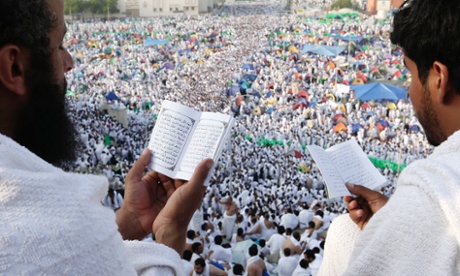
Saudi Arabia has made contingency plans in the event of an Ebola outbreak, including deploying medical staff at airports and setting up isolation units as nearly three million Muslims from across the world flock to perform the Hajj pilgrimage.
Adel al-Faqih, the Saudi health minister, said precautionary steps have been taken to prevent pilgrims with Ebola from entering the country as well as dealing with an emergency, local media have reported. He said there has been no diagnosed case of Ebola so far among pilgrims who have made it to Saudi Arabia.
According to the minister, Jeddah has coordinated with international health bodies, including the World Health Organisation (WHO), and the countries where Ebola has struck to protect the annual pilgrimage that takes place in the last month of the Islamic calendar. Earlier in the year, Saudi Arabia had announced it will not issue visas to pilgrims coming from Sierra Leone, Liberia and Guinea due to the spread of Ebola in those countries.
Hundreds of health officials have been deployed in international airports and more than 22,000 general practitioners assigned to deal with the pilgrims.
According to Abdel-Wahab Shalabi, a health official, 24 isolation units have been planed in the case of an outbreak as well as emergency rooms, surgery units and other facilities needed to treat patients.
At airports, Saudi officials are showing extra care to check foreign planes. At least 205 flights had been closely monitored so far, according to an official at King Abdulaziz international airport, Abdulghani Al-Malki.
“We have double-checked the papers that prove the aeroplanes had been sprayed twice before taking off to their destinations,” Al-Malki said, according to the English-language news website Saudi Gazette.
The news site said: “Recent statistics by health centres showed that all the pilgrims who arrived at the King Abdulaziz International Airport were free from these diseases.”
Earlier in the month, the Saudi Gazette reported that two special lounges had been dedicated to pilgrims coming from Nigeria and certain other African countries.
“So far 118,000 pilgrims have arrived by air from Nigeria. There was not a single suspected case of the deadly virus among them,” al-Malki reportedly told Al-Watan at the time.
“We are particularly checking pilgrims coming from countries with reported cases of Ebola including Nigeria, Kenya and Congo,” he said. “The trained and well-equipped medical teams board the planes immediately after landing. With the help of the crew, the teams will be looking at all passengers to see if any of them show symptoms of the virus.” According to al-Maliki pilgrims are asked to show which places they had visited in the last 21 days prior to their arrival and those suspected to have Ebola would be immediately transferred to King Fahd hospital in Jeddah.

The Arab News reported on Wednesday that some 15,000 pilgrims had arrived through the sea port in Jeddah but some 100 health staff were deployed to examine them before they could set foot on the Saudi soil.
Last month, Saudi Arabia said it had no plan to prevent pilgrims from Nigeria to participate in the Hajj.
“We have not stopped issuing Hajj visas to Nigerians and we know that about 70,000 pilgrims come from the African country every year,” said Mohammed Al-Khasheem, the deputy health minister. “We have taken precautionary measures to prevent an Ebola outbreak in the [Saudi] Kingdom during the Hajj season,” he said, according to Arab News. “We have made early preparations for the annual pilgrimage.”
Many countries have issued separate instructions on how potential Hajj visitors should be vigilant. The US Centers for Disease Control and Prevention (CDC) warned that more than 11,000 Americans visit Saudi Arabia for Hajj every year and asked those travelling to make health appointments a few weeks before the ritual, follow its food and water safety guidelines, prevent mosquito bites, use insect repellent, use disposable blades for head shaving and avoid swimming in fresh water.
In August, a Saudi man who was suspected to have died as a result of Ebola infection was buried in the capital. He was later identified as Ibrahim al-lZahrani, a businessman.
